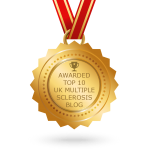MS-SMART and Anti-LINGO-1

Sometime we wish that …
At long last drugs are being tested to help slow down progression of SPMS. There are two trials in Phase 2 of the testing cycle. There is a good possibility something positive will be the result. The MS-SMART and Anti-LINGO-1 trials represent a real hope for us sufferers of SPMS. Each trial is evaluating how successfully the nerves in the central nervous system will be protected.
MS-SMART and Anti-LINGO-1
Take a look at the video. It explains the aims of the drug trial, what is being tested and other important information. The video does last for about 10 minutes but I hope you will get a better understanding of the trials and the timetables.
What conclusions.
First of all don’t hold your breath. The estimate is a minimum of 5 years before anything comes to market. The drug(s) for MS-SMART are being repurposed so the cost will be reasonable. The cost of anti-LINGO-1 is anyone’s guess but it will not be cheap; it is a new drug developed by Biogen a pharmaceutical company.
Anti-LINGO-1
The phase 2 trial involves 416 participants. They are being divided into five groups, each receiving either 3, 10, 30 or 100 mg of anti-LINGO-1 per kilo weight, or a placebo, once every 4 weeks for 72 weeks. All participants are also receiving beta-interferon-1a injections once weekly.
Researchers are investigating whether anti-LINGO-1 can improve the function of the nervous system, cognitive ability or disability over the 72 week timeframe.
The trial is due to complete in June 2016 so with luck and a following wind there should be report on the trial later in the year.
MS-SMART
The drugs being tested are amiloride, fluoxetine and riluzol. They are already licenced for other conditions, but they’ll need to undergo a larger phase 3 trial to definitively test their effectiveness in MS once the existing phase 2 trial has completed in 2 years time
Research is still at an early stage and it will be a few years before we know whether any of these drugs are effective treatments for people with MS.
Fingers crossed
Its taken a long time to identify drugs that could help sufferers of SPMS. Let’s hope the trials are successful. If so it will be a big step forward for the MS commuity



Im waiting to hear about the antilingo1 trials and how I can be involved
Pam Johnston
See reply already posted. I think it answers the questions.
Basically watch this space
Patrick
I really want to be in the anti lingo1 trials
Pam Johnston
Hello Pam,
Rsesults on Anti-LINGO-1 are very mixed. I copied this from the mS Society website#
A phase 2 trial (also by Biogen) testing the safety and effectiveness of anti-LINGO-1 in people with relapsing forms of MS (both relapsing remitting and/or secondary progressive MS) began in April 2013. In June 2016 Biogen reported that anti-LINGO-1 had missed its primary end point. The treatment failed to improve disability, physical or cognitive function.
This trial involved 416 participants, who were divided into five groups, each receiving either 3, 10, 30 or 100 mg of anti-LINGO-1 per kilo weight, or a placebo, once every 4 weeks for 72 weeks. All participants were also taking beta-interferon-1a injections once weekly. Researchers investigated whether anti-LINGO-1 can improve the function of the nervous system, cognitive ability or disability over the 72 week timeframe.
In other words a failure
RENEW trial
In April 2015, results from a phase 2 clinical trial testing the safety effectiveness of anti-LINGO-1 as a treatment for optic neuritis were announced at a conference.
The trial involved 82 participants with a first episode of acute optic neuritis. They were given 6 doses of anti-LINGO-1 (100 mg per kilo weight, once every 4 weeks for 20 weeks) or a placebo infusion.
Biogen, the manufacturers, found that those taking anti-LINGO-1 had better signalling along the optic nerve, suggesting myelin repair had taken place. Participants had a 41 per cent improvement in nerve signalling compared to the placebo group. While these results still need to be published in a scientific journal, these results are the first indication that a drug could promote remyelination in people.
It might be worth reading this post by ProfG from the Barts blog http://bit.ly/2a77wrD
Disappointed is the way a lot of people feel, myself included. Don’t forget MS-SMART and there is the possibility of Cladribine helping people with SPMS.
Patrick